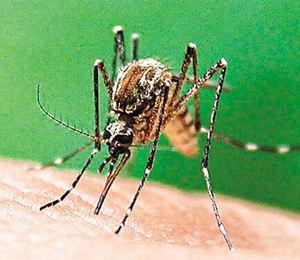
Definition
Dengue fever is a flu-like viral illness that is passed to humans through the bite of a mosquito. Children and infants who become infected with one of the causative viruses may have no symptoms or only a minor, flu-like illness. Adults who become infected may develop a more severe, even life-threatening illness. Because this illness may lead to potentially severe complications, you should contact your doctor immediately if you suspect that you have dengue fever. Causes There are four types of dengue viruses that can cause this illness. The viruses are carried by Aedes mosquitoes. When an infected mosquito bites a human, the virus enters the individual’s bloodstream and may cause illness. The infection is not passed between humans. Risk Factors The following factors increase your chances of developing dengue fever. If you have any of these risk factors, tell your doctor: Travel to tropical or subtropical areas, such as: *Africa *India *Southeast Asia and China *Middle East *Countries in the Caribbean and Central and South America *Australia *Locations in the Central and South Pacific Symptoms If you experience any of these symptoms do not assume it is due to dengue fever. These symptoms may be caused by other, less serious health conditions. Symptoms of dengue fever may include: *Headaches *Severe pain behind the eyes *Fever, chills *Red throat *Nasal congestion *Muscle pain *Bone pain *Skin symptoms: *Reddened skin *Increased sensitivity of skin to touch *Skin rash *Purple spots on the skin *Loss of appetite *Nausea *Vomiting *Liver and spleen enlargement *Hepatitis *Bad taste in the mouth *Minor bleeding from gums, nosebleeds, blood in urine and stool *During recovery: *Low energy *Fatigue *Depression A severe complication of dengue fever is called dengue hemorrhagic fever-dengue shock syndrome. If you have this syndrome, you may develop: *Dangerously low blood pressure *Weak pulse *Abdominal pain *Sweatiness *Pale or blue skin and lips *Uncontrolled bleeding (hemorrhage) from gums, nose, urinary, and/or *gastrointestinal tract Diagnosis Your doctor will ask about your symptoms and medical history, recent travel to areas known to harbor dengue fever, and perform a physical exam. Your primary care physician may refer you to a specialist in infectious diseases. Tests may include the following blood tests: Antibody tests to see if your body is producing substances that fight the dengue fever viruses Reverse transcriptase polymerase chain reaction test (RT-PCR) to determine the presence and quantity of virus present in the bloodstream Treatment Talk with your doctor about the best treatment plan for you. There are no medications available that can cure dengue fever. Treatment addresses the symptoms and attempts to avoid potential complications. Possible treatments include: Bed RestYou will need to get extra rest while you recover from your illness. Adequate HydrationYou should drink a lot of beverages (such as sports drinks) to help replace fluids, sugars, and salts lost during the illness. If you are unable to drink enough, you may need to receive intravenous fluids through a needle in your arm. Medications to Decrease Fever and PainYou may use acetaminophen (Tylenol) to treat fever and pain. Do not use aspirin, because it may increase the risk of bleeding.
Prevention
1. To help reduce your chances of getting dengue fever, take the following steps when traveling in areas where dengue fever is common:
2. Try to spend your time in locations that are protected by good screens or are air-conditioned. 3. Wear long-sleeved shirts and pants, as well as socks and shoes.
4. Use insect repellants (preferably those containing DEET) on your skin and your clothing.
5. Either stay inside or take extra precautions during the times of day when mosquitoes are most likely to bite (early morning and late afternoon/early evening).
6. Because mosquitoes breed in standing water, do not leave standing water in buckets, flowers pots, or other containers.

No comments:
Post a Comment